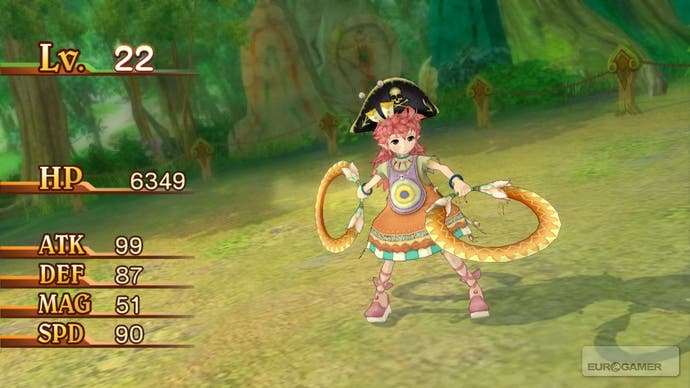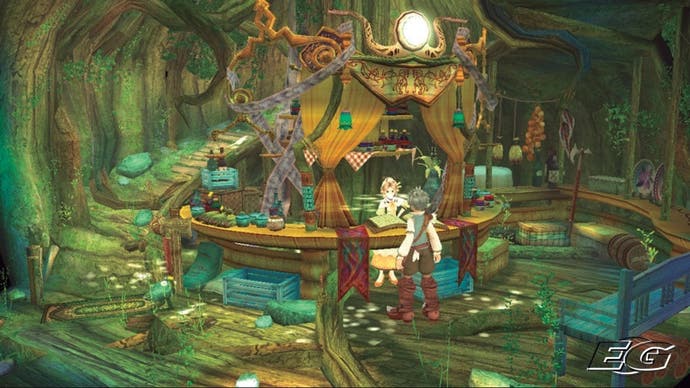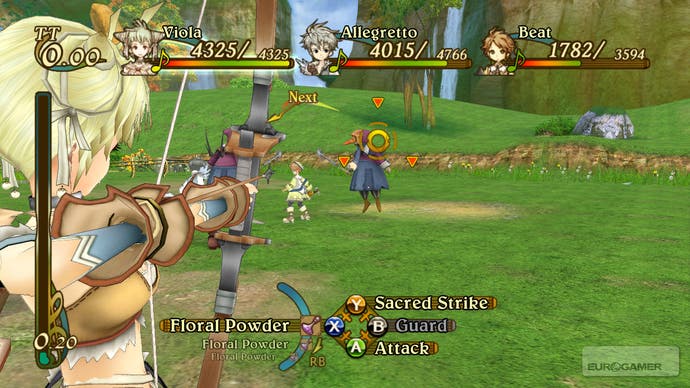Eternal Sonata
A demonstration of beauty.
Light and Shade
This system is interesting enough on its own, but the developers have added another layer of complexity to the battle system - light and shade. Most battle areas have a dappled pattern of light and shade on the ground, and the positioning of your characters and your foes on this pattern can make a huge difference to the battle.
Some foes, for example, are vastly more powerful in shade than they are in light. Some even change into entirely different creatures when they're in the dark; the fairly innocuous vegetable-like Very Very Empty creatures (some of the names are pretty special), for instance, turn into enormous poison-belching Great Coconuts when they're out of the light.
Your characters, too, change in the darkness - or at least, their attacks do. Special attacks rely entirely on whether you're standing in light or shade, and each character has two specials equipped at any one time - one for standing in darkness, one for standing in light. This makes positioning even more important, since you may only be able to use the attack you need if you're standing in the shade, for instance.

The result is a battle system which is vastly more complex and interesting than it initially looks. It manages to be action-focused and frantic enough to hold the attention of gamers used to a more rapid pace in their entertainment, without actually introducing tricky action sequences which would put off traditional RPG players - a tricky balancing act, but one which the Eternal Sonata demo shows off working very nicely.
The demo also hints at several other systems in the game which could end up being quite interesting, although it's impossible to tell from the tiny amount of content we've seen. Beat, for example, has a special attack which allows you to take a picture in first-person mode, which can then be viewed from the menu screen. We've yet to find a use for this function, but pictures are graded by the game according to their quality, which hints at an interesting photographic mini-game.
There's also a collection game we uncovered in the village, which involves finding pieces of Chopin's scores around the world - and then finding other musicians who have their own pieces of the score, and playing them together as a duet. Some pieces go better than others, and the game will reward players who find the best and most melodious combinations of music.

Overall, as you'd expect, music plays a very major role in the game. Character's weapons and equipment are designed to look like classical musical instruments, and the emblems of music notation are a running visual theme in the artwork. Chopin's own compositions are the basis for much of the music, with his work clearly being a key inspiration for celebrated game composer Motoi Sakuraba (whose music has previously graced series including Tales, Star Ocean and Baten Kaitos).
Rather less impressive, sadly, is the voice acting in the game - which is available only in one flavour, American English, in the demo we've played. We sincerely hope that this is only down to the need to keep the demo file size small, and that Japanese voices with subtitles will be available as an option in the final game.
It's always nice to have the option, for one thing; but more importantly, the English voice acting in Eternal Sonata is some of the worst we've ever had the misfortune to hear. It's a bad sign when you're shouting "JUST SHUT UP!" at the characters in a game only ten minutes into a demo - but the combination of Allegretto's repellant surfer-dude expressions and intonation, and Polka's utterly painful squeaking more than justified our malcontent. Note to dubbing directors - middle aged women trying to squeak out their lines in order to sound like "cute little girls" is exactly the kind of thing that makes Baby Jesus bawl his eyes out.
Tuneful Conclusion

With its beautiful visuals, great music and fascinating battle system, Eternal Sonata is arguably the most interesting RPG coming out of Japan this year - on any platform. The fact that it's on the Xbox 360 just adds a frisson of surprise to the whole affair, but even judged on its own merits as a videogame (rather than as an unwilling pawn in the Great Console War of 2007), this looks like a stand-out addition to the genre.
We await a more comprehensive look at Namco Bandai's gorgeous, tuneful adventure with bated breath; and, indeed, with crossed fingers regarding the language selection option. The game arrives in Europe this November, and we hope to have a more in-depth look at its charms in the next couple of months.


.png?width=291&height=164&fit=crop&quality=80&format=jpg&auto=webp)




.jpg?width=291&height=164&fit=crop&quality=80&format=jpg&auto=webp)
